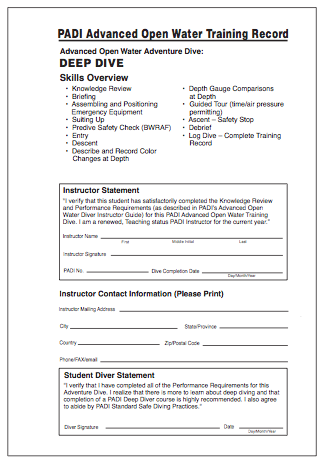4 Great Reasons to Do Your PADI Deep Adventure Dive
Congratulations, you're a certified diver! As a PADI Open Water Diver, you are certified to plan and execute a dive on your own with a buddy to maximum 18 meters/60 feet. You are well on your way to an exciting underwater adventure and a profound relationship with the planet's waters.
While you will be planning and executing dives just with a dive buddy or under the indirect supervision of a dive professional in many places, especially in Europe and North America, there are also a lot of places around the world that you will be guided by a professional on all your dives. The dive centers will set your gear up, take it apart, brief you, and guide you. It's very easy to get complacent after your course when you don't have to lift a finger or plan your dives anymore.
At Roatan Divers, we're all about 60 minute dives, so we normally set our dives to maximum 18 meters/60 feet, unless a specific dive site warrants a deeper depth, for better air consumption and longer no-decompression limits. We're also very strict about sticking to the depth limits of each divers' certification levels, so we pick our sites based on certification and experience levels.
When we have divers that are Open Water certified and want to go to El Aguila wreck (or other deep sites), we always do the dive as a PADI Deep Adventure dive, for our divers' safety and future opportunities.
What is the PADI Deep Adventure dive?
The PADI Deep Adventure dive is one of the required dives of your PADI Advanced Open Water Diver course, and is the dive that certifies you to maximum 30 meters/100 feet. As an autonomous, certified diver, you can go to whatever depths you want, and many dive centers around the world will take you past your certification limits, but there are multiple reasons why you should do your PADI Deep Adventure dive before going deeper than 18 meters/60 feet:
1. Extra training is always good
There are additional risks to consider when diving deeper, so it's always a good idea to get the proper training. In the theory for the PADI Deep Adventure dive, you learn more about no-decompression limits, decompression sickness, nitrogen narcosis, and about the protocols for deeper diving, all of which will benefit your diving and your safety in the future.
2. You have greater opportunities for your future diving
A lot of dive centers divide groups up based on their certification and experience levels. If you are an Open Water Diver with 50 dives but don't have the training to go deeper, then you may be put in a group of less experienced divers and taken to easier dive sites. If you have the training to go to 30 meters/100 feet, then that will certainly open up your diving opportunities.
3. It counts as credit for future courses
The PADI Deep Adventure dive counts as credit towards your PADI Advanced Open Water Diver course, as well as your PADI Deep Diver specialty course. So on top of the extra training that you get and the opportunities it opens up, you also have the opportunity to get more certifications in the future! It's a win all around.
4. Insurance purposes
While good diving insurance will cover you with regards to diving accidents, there is a very high chance they won't cover you if you exceed the limits of your training, so if you are a PADI Open Water Diver and get into an accident at 30 meters/100 feet and haven't completed the PADI Deep Adventure dive, then your insurance may not cover you because you made the choice to exceed your own limits. It's a bit of a bummer of a reason to do the Deep dive, but an important reason to consider.
As a scuba diver, you should never stop learning. Never stop your pursuit of continuing education, never stop practicing. Scuba diving is a fun experience that brings groups of people together, but it's also a sport, so it's important to keep your skills updated. There is always more you can learn to become a better scuba diver.
Happy diving!


